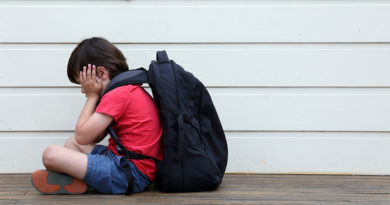Trouble at the Preschool Door – Drop-off Tantrums
Drop-off dread
It is Monday morning and you are not dreading the morning traffic, or the meeting with your boss, but instead you fear the drop-off scene at your child’s preschool. You are hoping that you will at least reach the school lobby before he cements his feet to the ground and screams “I am not going in there!”
Separation difficulties can happen with any child at any time during their preschool years. Whether this is your child’s first preschool experience or a mid-year crisis, you have probably tried everything, including a few tempting special treats, but he will not be convinced that preschool is the place where he should be. Today you actually made it to the classroom before he crumbled to the ground crying “don’t leave me here!”

Why my child?
The reasons for these difficult goodbyes at the preschool door are as varied as the personalities of the children who experience them. Separation anxiety is felt for many reasons throughout a person’s life. For young children who are still so dependent on their parents, separation can be terrifying.
A new environment, new faces, and new adult caregivers can be frightening for even the most independent child. Some children balk at the idea of being part of a big group where children must share and take turns. Other children find the noise and activity level of a classroom to be overwhelming.
Separation woes
Changes in your child’s life or just returning to school after a vacation or an illness can be a stressful readjustment. Even something as simple as a parent away on a business trip can set off separation woes.
Occasionally, a negative experience at preschool will lead to drop-off trouble. Be sure to listen to your child if she has specific complaints — being upset at drop off and being upset all day long are very different problems.
Drop-off routine to the rescue
Whether this is your child’s first school experience or a new phase, these early morning meltdowns are draining for everyone involved. So what do you do when your child refuses to say goodbye and happily trot off to a busy day at preschool? What you need is a “drop off routine.” Children thrive on the predictability of rituals and routines. Just as a good bedtime ritual helps you to enforce parting until dawn, a consistent drop- off routine will help you part for a day at preschool.
Creating the drop-off routine should be a collaborative effort with your child’s teacher. Select a series of steps that you will take every day when you and your child arrive at preschool. The goal is not to delay the inevitable, but to ritualize the goodbye. The predictability may help your child remain calm as the “goodbye” approaches.
Keep it simple
Your routine could be as simple as helping your child hang up his coat, reading two books in the reading corner, and then waving goodbye at the door. Or you could decide to watch your child color a picture and take it with you when you depart. The routine can change over time, and eventually you might not even need one.
A drop-off routine will not always keep your child from crying, especially at first. Some children cry for days before they adjust. Once you have finished the activities in your routine, you may need the teacher’s reassuring arms to help your child as you leave.
Helping children with separation is a large part of a preschool teacher’s job. Often the teacher is more effective at calming down your child after the dreaded goodbye has passed. Believe your child’s teacher when she says that your little one only cried for ten minutes or so. But ask her to let you know if she is consistently unable to calm your child.
Simple steps for separation
There are other simple steps that can help your child adjust to the separation. Leave a family photo in your child’s cubby. Demonstrate to your child that you trust and like his teacher with a happy greeting in the morning. Provide your child with an opportunity to talk about his feelings, but do not dwell on the issue. Try to relax and have faith that this problem will pass. Before you know it you will be hearing “but I said I don’t want to go home!”



